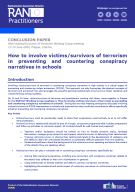Details
- Publication date
- 1 August 2024
- Author
- Directorate-General for Migration and Home Affairs
- RAN Publications Topic
- Community engagement/civil society
- Deradicalisation/disengagement and exit work
- Rehabilitation
Description
In the field of rehabilitation and distancing from violent extremism, time is an essential resource. As a practitioner, building the working relationship (also referred to as ‘working alliance’) required for an exit intervention takes time. Additionally, the personal development of a radicalised person to a rehabilitated individual is a time-consuming process. Also on an organisational level, referring to other agencies or working in a multi-agency setting also cannot instantly be achieved. On top of this there are external variables that play a role, such as the length of a criminal offender's jail or probation sentence or the available resources of the implementing organisation (including personnel and funds).
As a result, rehabilitation interventions often need to be modified to what is feasible. This forces practitioners to prioritise and thus potentially neglect other specific working areas while keeping track of the overall aim: their client’s comprehensive and sustainable distancing from violent extremism.
While the time aspect of rehabilitation is crucial to the distancing process, it had not been specifically addressed yet within RAN Practitioners prior to this meeting. Thus, the meeting offered an opportunity to build a comprehensive understanding of what challenges exit practitioners encounter in relation to managing the time aspect in their interventions and what solutions they have found to do so. Core issues addressed include the time required for the individual disengagement, rehabilitation, and resocialisation process of the intervention recipient and for practitioners to build a functioning working alliance as well as safeguarding achievements made in the exit process.
The following key outcomes were noted:
- If limited time is available, be clear to the participant on what issues you will work with them. A realistic planning is key. Rather under promise and over deliver than the other way around.
- Avoid ‘eternal’ support as in the end it is needed that people learn to stand on their own feet.
- Organise aftercare as radicalisation is not a linear process and new situations can increase the risk of relapse.
- An assessment-based approach can work well to finish support when the objectives are met.
- Rehabilitation programmes are not always the end of support needed on all aspects of life. It is recommended that a follow-up is being organised in time.

